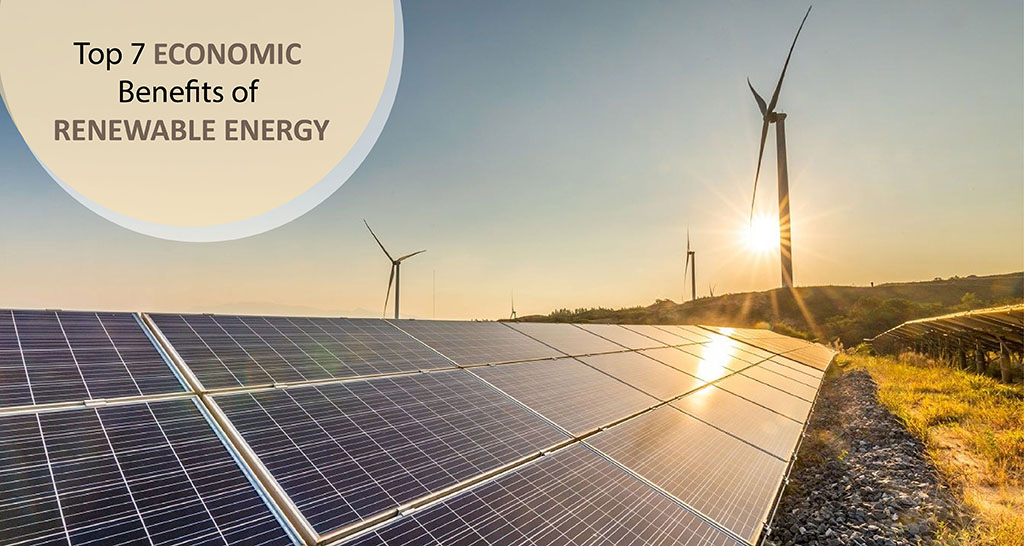Renewable energy is a clean, environment-friendly, and everlasting source of energy. It differs from conventional energy sources like fossil fuels, due to its ample existence, diversity, and availability worldwide. According to some environmental agencies and environmentalists, the demand for renewable energy will significantly rise by 2040. So, this increasing demand and use of renewable energy sources not only have an impact on nature but also on the economic growth of the world.
Climate change is one of the issues related to our planet’s health. Renewable energy is tackling environmental problems like global warming and climate change. Thus, many business tycoons and leading entrepreneurs adopt to create and develop renewable energy-related businesses. Thus, positive growth in sustainable energies generates opportunities for economic development by creating green energy.
In this article, we will discuss some economic benefits of renewable energy sources.
- Affordable installation and maintenance
Renewable energy, like solar energy, is affordable for most people because materials which are generally used for creating energy sources are less expensive. Thus, installing and adopting solar, wind, and other green energy sources for homes and businesses is easy, safe, and convenient to use. The most desirable feature of solar energy is it gives a huge amount of electric and heat energy with minimum maintenance issues later on. If there is any maintenance issue, workers can easily solve it with affordable charges. So, overall investment in clean and green energy rewards you with a supply of green energy as well as economic benefits.
- Lower down cost of electricity bills
The foremost and biggest economic benefit of renewable energy resources is in the cost of electricity that they create. Converting your electricity consumption from the local power grid to solar energy can help you to shorten the cost of your energy bills. Solar installations, wind turbines, and other types of conventional energy sources generate electricity at a lower cost. Instead of using coal power plants to create electricity, we can use solar energy, which reduces the number of pollutants and gas emissions released every day in the environment. These replenishable energies also take the edge off of carbon footprints by around 70-80% in a year. According to the IEA, the use of green energy sources increased in 2020 by 3%, and demand for other fuels get declined. So, besides environmental benefits, renewable energy resources can also gain economic benefits.
- Saves money
Renewable sources are affordable to adopt and also help to save money after use. Renewable energies most obviously save money by reducing many household and industrial electricity bills. Installation of solar energy and the building of wind turbines are long-term beneficial electricity sources that considerably reduce energy bills. Relying on a conventional local power grid means you pay more than the export of energy to that grid. But in terms of solar energy, you can back and sell the excess energy produced by your business to the power grid, which is best for your business from an economic perspective. Most of the research and studies show that the cost of installation of renewable energies will go down because many innovations in renewable technologies are done in the world.
- Create employment opportunities
Investment and creation of renewable energy power plants directly lead to employment opportunities worldwide. Installation of solar power plants and the building of wind turbines generate a large number of jobs and working chances for people. It is found in research that solar industries employ almost millions of workers around the world. Employment opportunities in clean energy reached about 12.7 million last year, and 700,00 new jobs were created in one year. This employment generation is undoubtedly long-lasting till there is the sun to shine and the wind to blow.
- Low fuel prices
Renewable natural resources offer clean and green energy as well as environment-friendly fuel. Renewable and green fuels like biogas, bioethanol, and biodiesel can be used to run vehicles without any harmful emissions of gasses or pollutants. These renewable fuels are made up of organic masses and vegetable oil, making them fully green and clean. The organic materials and applications required for extraction of these fuels are easily available at low cost; therefore, the fuel price for vehicles is low for fuel generated with renewable energy sources.
- Stable energy prices
The world normally experiences fluctuations in the prices of fossil fuel and energy which is generated by it. In the case of renewables prices and costs of energy and fuel are stable because there is a large amount of source available to regenerate that energy or fuel again. It is also assumed that energy prices of renewables lower in the future. So the stable prices of green and clean energy, make energy affordable and cheap for people.
- Increased investment opportunities
Outstanding growth and an increase in the use of renewable energy appliances and power plants might be profitable to investors who want to invest in clean energy. Studies have shown that investing in renewable energy can reduce volatility and increase returns in one’s portfolio. As increased demand and importance of green energy attract many leading investors to invest in it. However, solar industries are outreaching fossil fuels by creating abundant amounts of energy. This indicates that the future of energy and fuel is clean and renewable energy sources.
Final Say
According to US research, by 2030, about 65% of total electric energy will be supplied by renewable energy sources. Therefore, switching to renewables ensures green energy and fuel supply to the world. So, these economic benefits stipulate that the future of renewable energy will be positive.








